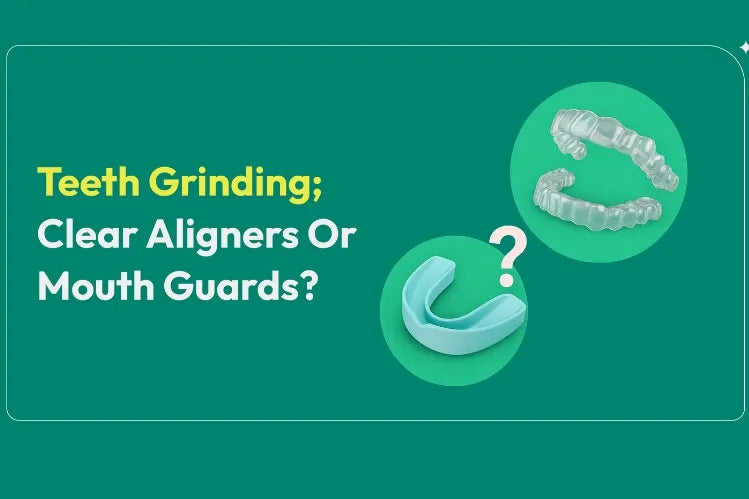
Table of Contents
- What is Bruxism, and Why Does It Happen?
- Bruxism Treatment Options
- Do Aligners Protect Teeth from Grinding?
- Clear Aligners for Bruxism for Fixing the Problem at Its Roots
- Difference between Aligners and Mouthguards/ Nightguards
- Why Choose Smilepath for Bruxism & Alignment?
- Can Clear Aligners Help with Bruxism?
- FAQs
Not every case of teeth grinding requires a guard, but all grinding should be addressed.
If you are experiencing a sore jaw, dull headaches, and/or flattened edges of your teeth when you wake up, chances are that you are exhibiting signs of bruxism, a disorder that often goes overlooked until it impacts daily comfort and oral health.
For moderate to severe bruxism, a mouthguard for teeth grinding is still the gold standard. For mild bruxism that is triggered by misaligned teeth, that is where aligners can come to help! Though clear aligners aren't a replacement for a mouthguard, they can offer an innovative, dual-purpose treatment of the primary cause of bruxism.
While aligners won’t treat every type of bruxism, they can offer gentle protection for mild grinding and long-term benefits if the root cause of your bruxism is your misaligned teeth. And when paired with expert monitoring, like that offered by Smilepath, they can be a meaningful step toward a healthier, more balanced bite.
In this guide, we'll talk about bruxism and invisible braces, the differences between aligners and mouthguards, and how Smilepath will help you obtain protection and correction, however you choose.
What is Bruxism, and Why Does It Happen?
Bruxism, commonly referred to as teeth grinding or jaw clenching, involves the unconscious grinding of teeth and tightening of the jaw, often during sleep. It is more widespread than most people think and can be triggered by various factors. Identifying these causes is key to effectively managing the condition.
Common Triggers of Bruxism
- Stress and Anxiety: Psychological factors play an important role in bruxism. When someone is experiencing stress or anxiety, it can affect them mentally and cause them to clench or grind their teeth subconsciously, to cope.
- Sleep Disorders: Disorders such as sleep apnea can disrupt the normal sleeping cycle and have been shown to increase teeth grinding. Other disturbances in sleeping can also increase the likelihood of bruxism.
- Misaligned Bite or Teeth: An improperly fitted bite, or misalignment of teeth, can lead to discomfort for the patient and can lead to teeth grinding as the body attempts to adjust naturally.
- Lifestyle Choices: Specific behaviors and daily habits can contribute to the development of bruxism.
- Caffeine or Alcohol: Excessive consumption of alcohol or caffeine can lead to increased levels of nervous tension. Smoking can contribute to muscle tension and increased stress. All of these enhance the likelihood of teeth grinding.
Consequences of Untreated Bruxism

If bruxism is left untreated, it can result in several oral health issues and discomfort, such as:
- Tooth Sensitivity and Enamel Erosion: Constant grinding can wear down the tooth enamel, leading to increased tooth sensitivity, especially to hot or cold stimuli.
- Cracks or Chips in Teeth: Persistent grinding can exert excessive force on the teeth, leading to cracks or chips that weaken their overall structure.
- Gum Recession: The mechanical forces exerted during bruxism can also affect the gums, leading to recession and exposing the roots of the teeth, which can result in further sensitivity and other dental issues.
- TMJ Dysfunction: The temporomandibular joint (TMJ) , which connects the jaw to the skull, can become strained and dysfunctional due to the excessive force from grinding. This can lead to pain, stiffness, and a reduced range of motion in the jaw.
- Facial Pain and Interrupted Sleep: Bruxism can cause discomfort not only in the teeth but also in the face, neck, and shoulders. Additionally, grinding can lead to waking up during the night, resulting in fatigue and a decreased quality of sleep.
By identifying the signs and seeking treatment, bruxism can be managed. Depending on the situation, this may include managing stress, a dentist's intervention, or addressing behavior and lifestyle changes that can minimize triggers and limit the complications associated with this condition.
Bruxism Treatment Options
Traditional bruxism treatment options range from dental night guards to stress management. When it comes to managing teeth grinding, or bruxism, people often ask questions like: how to stop teeth grinding naturally? There are several techniques to consider. Here’s a quick look at some effective options to guard and treat bruxism.
- Custom Night Guards: These dental devices are designed to fit your mouth perfectly and act as a protective barrier between your teeth, and are the best nighttime teeth grinding solution. While they can prevent damage caused by grinding, it’s important to note that they don't address the underlying issues that may be contributing to the behavior.
- Behavioral Therapy: For many individuals, bruxism is often linked to stress and anxiety. Behavioral therapy can help develop coping strategies and techniques to reduce stress-related clenching, ultimately minimizing the grinding behavior.
- Dental Correction: Misalignment of teeth can often contribute significantly to bruxism. Orthodontic treatments, such as braces or clear aligners, can be used to correct these misalignments. This approach can address one of the more commonly overlooked causes of teeth grinding.
- Medications: In more severe cases, healthcare providers may prescribe medications like muscle relaxants or antidepressants to help manage bruxism. These can help alleviate some of the physical tension in the jaw muscles or address underlying anxiety or depression that may be exacerbating the issue.
Clear aligners are perfect if you have a mild teeth grinding issue caused by misalignment. Clear aligners not only help correct your teeth, but they also create a barrier between your upper and lower arches, which may help prevent grinding.
However, if you have severe teeth grinding issues, then your clear aligners can break due to excessive pressure. But don’t worry because Smilepath has got you covered. We offer custom-fit, discreet nightguards to protect your smile from grinding. While aligners work all day to straighten your teeth, your night guards will protect your smile from grinding at night. A perfect duo for a perfect smile.
Do Aligners Protect Teeth from Grinding?
Yes, to some extent! While not originally designed to replace a mouth guard, clear aligners do offer a layer of protection between your upper and lower teeth. Many users with minor grinding-related issues see a difference shortly after starting aligner treatment.
Here’s why:
- Aligners are snug, custom-fitted, and cover your teeth entirely, like a lightweight shield.
- They reduce the surface-to-surface contact, which minimizes friction and pressure from grinding.
- With continued use, aligners can realign your bite, which may reduce your urge to grind altogether.
So, do aligners protect teeth from grinding? Yes, they do, but only if you have mild grinding issues caused by misaligned teeth.
Clear Aligners for Bruxism for Fixing the Problem at Its Roots
Many people suffer from bruxism because of malocclusion (a misaligned bite). If your top and bottom teeth don’t sit right, your jaw naturally shifts in an attempt to "correct" the bite, especially during sleep. This repetitive motion is often the root cause of teeth grinding.
That’s where Smilepath steps in with its sleek, dentist-supervised invisible braces and teeth grinding solution.
Smilepath clear aligners work by gradually moving your teeth into the correct position. As your bite improves, the pressure on your jaw reduces, and so does the grinding.
Benefits include:
- Gentle, round-the-clock protection
- Gradual correction of alignment issues
- Reduction in grinding-related discomfort
- Comfortable and virtually invisible wear
Difference between Aligners and Mouthguards/ Nightguards

Both aligners and mouthguards may look similar, but they serve different purposes. Here's how they compare:
| Feature | Clear Aligners | Mouthguards/Nightguards for Bruxism |
| Main Purpose | Teeth straightening & mild protection | Tooth protection only |
| Material | Durable, slightly firm BPA-free plastic | Softer, thicker plastic |
| Daytime Wear | Yes (20–22 hrs/day) | No (mostly worn at night) |
| Treats the causes of bruxism? | Yes (via alignment correction) | No (only addresses symptoms) |
| Aesthetic Appeal | Discreet and invisible | Often bulky and visible |
| Custom Fit | Yes | Yes |
Why Choose Smilepath for Bruxism & Alignment?
At Smilepath, we’re more than just a clear aligner brand; we’re your smile partner. Our aligners are designed for comfort and aesthetics, and paired with our night guard, you can have added protection from nighttime grinding. With Smilepath, you get:
- Dentist-approved treatment plans
- At-home impression kits with fast delivery
- Remote monitoring from Australian dental experts
- Affordable prices with flexible payment options
- Custom-built trays tailored for your unique smile
Thousands of Australians have already transformed their smiles with us, with many night guard users reporting reduced jaw pain, fewer headaches, and better sleep. Now it’s your turn.
Can Clear Aligners Help with Bruxism?
Bruxism, or teeth grinding, can often be connected to issues like teeth misalignment. Many people may not realize that addressing these underlying issues can significantly reduce the frequency and severity of grinding.
With options like Smilepath, individuals can enjoy a solution that prioritizes both aesthetics and practicality. Unlike traditional mouthguards, which can be bulky and unattractive, Smilepath offers clear aligners and night guards that are discreet and customizable to fit your unique smile. This means you can protect your teeth without compromising your appearance or comfort.
So, investing in daytime clear aligners and a night guard in Australia for grinding can be a budget-friendly choice, especially when considering the potential long-term dental costs associated with untreated bruxism, such as worn teeth or jaw issues. Overall, clear aligners represent a modern, stylish, and effective approach to better oral health.
FAQs
They can help with mild grinding by providing a barrier between teeth, but they are not a substitute for a mouthguard in moderate to severe cases.
A permanent fix depends on the cause. Options include managing stress, correcting bite issues with aligners, or using a nightguard for ongoing protection.
There’s no age limit. Adults of all ages can use clear aligners as long as their teeth and gums are healthy.
Yes, but only in mild cases. Clear aligners can offer limited protection and may help reduce grinding if it's caused by misalignment.
Citations:
Bruxism (Teeth grinding). (2025b, June 2). Cleveland Clinic. https://my.clevelandclinic.org/health/diseases/10955-teeth-grinding-bruxism
Heleiwa-Ferioli, T., & De La Cruz Vigo, S. (2024). Association between bruxism and the use of aligners in orthodontics. Journal of Clinical and Experimental Dentistry, e1247–e1255. https://doi.org/10.4317/jced.61951
Seed, S. (2023, December 14). Bruxism (Teeth grinding): How do I stop it? WebMD. https://www.webmd.com/oral-health/teeth-grinding-bruxism







 Australia
Australia New Zealand
New Zealand Malaysia
Malaysia English
English Portuguese
Portuguese English
English English
English English
English English
English English
English Canada
Canada